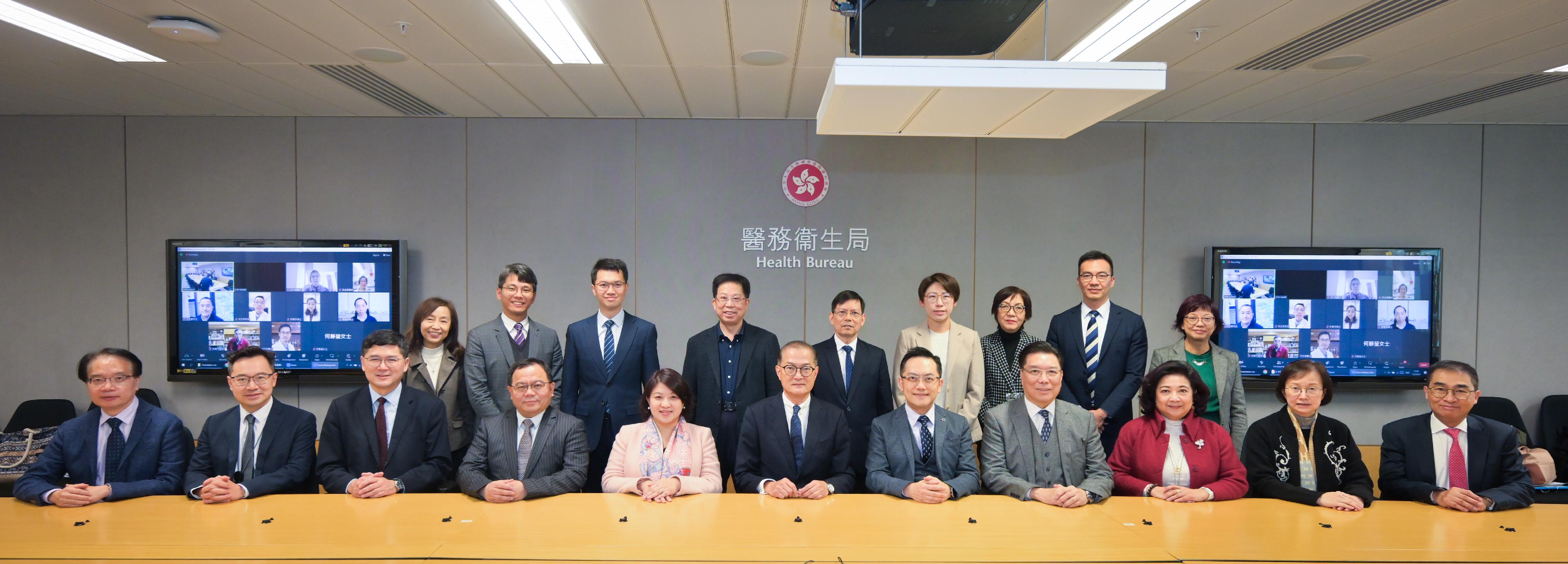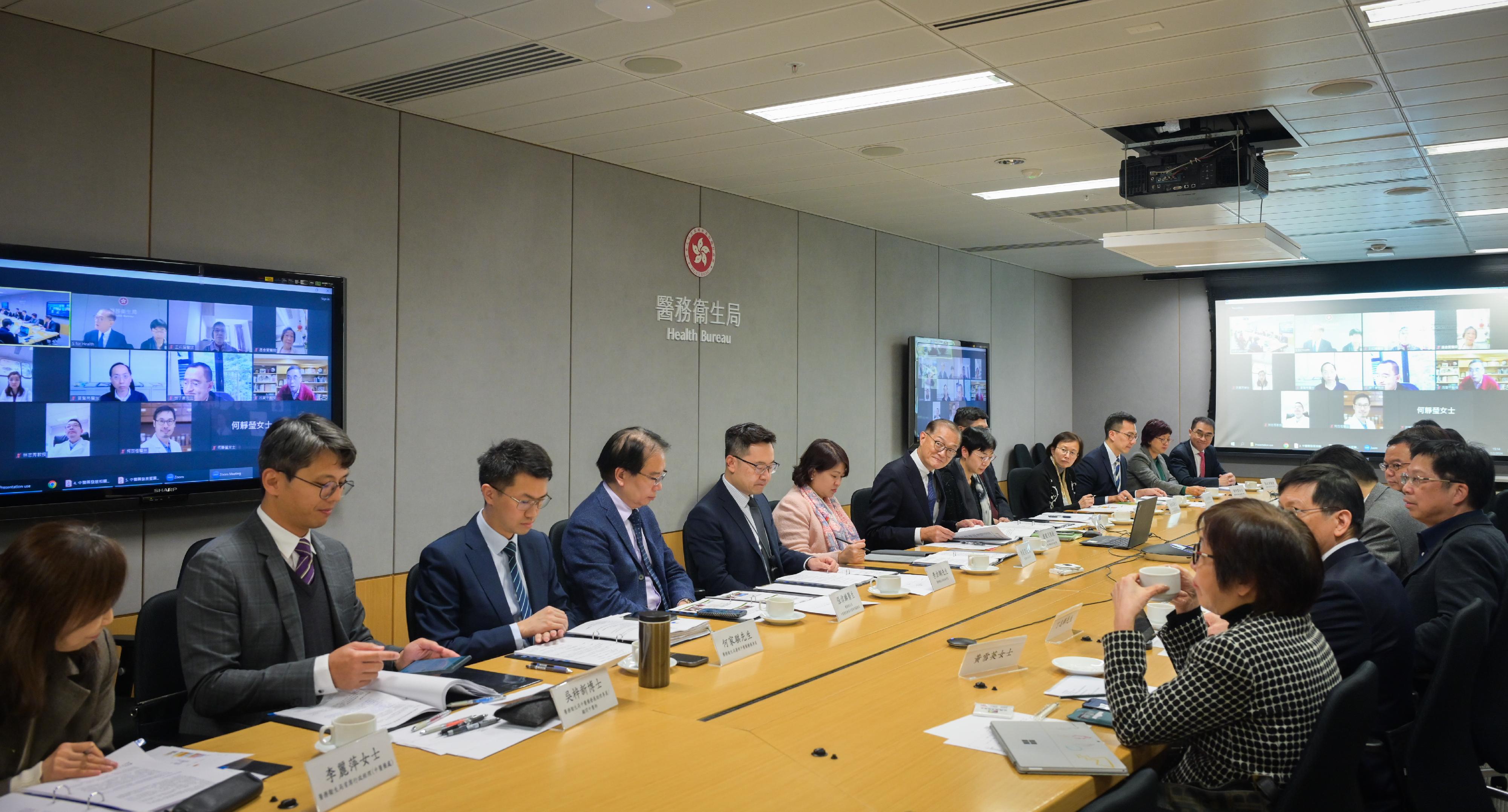Secretary for Health chairs 14th meeting of Chinese Medicine Development Committee (with photos)
The Secretary for Health, Professor Lo Chung-mau, chaired the 14th meeting of the Chinese Medicine Development Committee (CMDC) today (February 7) to listen to members’ views on the latest progress of various policy initiatives on Chinese medicine (CM) development and engage in in-depth exchanges with the members on the formulation work of the CM Development Blueprint.
Professor Lo said, “The Government attaches great importance to the development of CM, and has been stepping up efforts and devoting more resources to fully press ahead with various tasks in promoting CM development in recent years. In his 2023 Policy Address, the Chief Executive put forward a number of policy initiatives in relation to CM development, including taking forward the preparatory work for Hong Kong’s first Chinese Medicine Hospital, strengthening integrated Chinese-Western medicine (ICWM) services, promoting scientific research and standard-setting for CM testing, formulating the CM Development Blueprint and boosting the establishment of CM talent pool.”
Professor Lo made particular reference to the CM Development Blueprint which will map out the vision and strategies for the future development of the CM industry in Hong Kong, with a view to optimising the top-tier design for the development of policies. The Chinese Medicine Unit (CMU) of the Health Bureau (HHB) has commenced last September the stakeholder engagement work for formulating the Blueprint, so as to collaborate with the CM sector in setting out the short, medium and long-term objectives for the overall development and long-term planning of CM in Hong Kong as well as making respective recommendations and action plans. In addition, the CMDC will set up a CM Development Blueprint Subcommittee and its three working groups to focus on discussions of various topics on CM development.
During the meeting, representatives of the relevant government departments and organisations briefed the CMDC on the latest progress and major achievements of multiple policy initiatives on CM development, including:
- The construction and preparation work for the commissioning of the Chinese Medicine Hospital of Hong Kong (CMH) is progressing at full steam, with the premises expected to be handed over in batches by next year to tie in with the need for service commencement. The CMH announced the composition of its core management team and signed a strategic collaboration agreement with Guangdong Provincial Hospital of Traditional Chinese Medicine last month to foster co-operation on various fronts covering the preparatory work for the hospital’s commissioning, exchange of CM talent, cross-boundary distance discussion of cases, establishment of a sharing platform for drug interaction alert notification and development of a scientific research network;
- Starting from October last year, the quota for government-subsidised CM outpatient services provided at the 18 Chinese Medicine Clinics cum Training and Research Centres has been increased from about 600 000 per year to 800 000 per year, marking a 30-plus per cent surge in quantity;
- Having regularised the ICWM Pilot Programme early last year, the Hospital Authority (HA) has further extended the services to more public hospitals and other disease areas, including increasing the number of participating wards providing stroke care and introducing the new cancer care pilot programme in 2023-24;
- To accelerate the promotion of CM informatisation and digitalisation, and to facilitate the sharing of information, the Government Chinese Medicines Testing Institute (GCMTI) of the Department of Health is strenuously gearing up for the launch of a world-class Digitalised Chinese Medicines Information Platform, while at the same time taking forward the work on promoting testing, scientific research and education as well as enhancing international exchanges on CM drugs;
- Since the launch of the Chinese Medicine Development Fund (CMDF) in June 2019, nearly 7 500 funding applications have been approved to date, benefitting various stakeholders of the CM sector. The Government has also been continuously refining the funding arrangement of the CMDF, and has injected an additional $500 million to commission organisations to conduct large-scale training, publicity and research projects on strategically priority themes, and to take forward new capacity-building initiatives for the industry;
- The Government continues to establish closer exchanges with relevant ministries as well as various provinces and cities of the Mainland to initiate collaboration in the realm of CM, strengthening Hong Kong’s role under the Construction Plan for the Chinese Medicine Highlands in the Guangdong-Hong Kong-Macao Greater Bay Area (2020-2025) for proactive integration into the overall development of CM in the country, and at the same time capitalising on Hong Kong’s strengths to give full play to the city’s role as the country’s gateway to the international markets and contribute to the internationalisation of CM;
- The Government actively promotes various types of high-quality CM talent nurturing projects, including co-organising the first edition of the Hong Kong Chinese Medicine Talent Short-term Training Programme with the National Administration of Traditional Chinese Medicine in November last year, and encourages local CM practitioners to actively participate in different CM training programmes and award schemes on the Mainland;
- The Government continues to encourage the CM sector to promote professional development and improve its standard, enhance industry development and expand new markets, deepen applied studies and research, and assist in tackling public health incidents; and
- Upon strengthening its functions since 2023-24, the CMU of the HHB has been dedicated to pushing forward various tasks in different aspects, including driving the overall planning and co-ordination on policies of CM development as well as deepening the communication and connection with CM stakeholders in Hong Kong and the Mainland.
Professor Lo added, “We would like to express gratitude to the members for their valuable advice on the Government’s policy initiatives in promoting CM development. Among all, I earnestly anticipate that the two flagship institutions, namely the CMH and the GCMTI, will serve as the key platforms for the city’s CM development in the future, giving strong impetus to promote the holistic and high-quality development of CM. With the support of our country as well as the joint efforts of the Government and the CM sector, the development of CM in Hong Kong will certainly usher in a new era, new opportunities and a new outlook.”
The Under Secretary for Health, Dr Libby Lee; the Director of Health, Dr Ronald Lam; the Chief Executive of the HA, Dr Tony Ko, as well as representatives of the relevant government departments and organisations also attended today’s meeting.
Established in 2013 and chaired by the Secretary for Health, the CMDC drives the direction and long-term strategies for the future development of CM in Hong Kong by providing recommendations to the Government on four key areas, including the development of CM services, personnel training and professional development, scientific research and development, and development of the CM drug industry (including CM drug testing). read more




